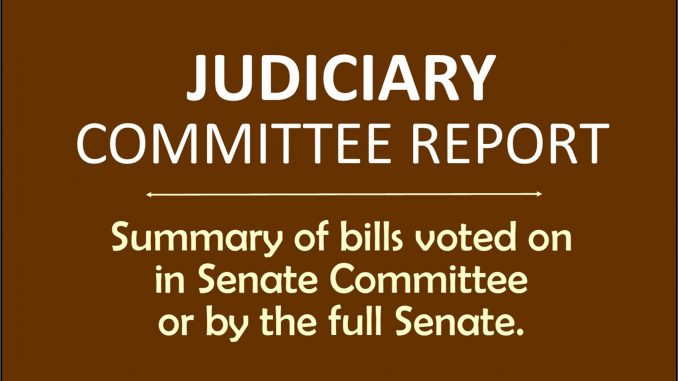
On this page
COMMITTEE ACTION:
SF 300 – Dependent Adult Abuse
SF 300 creates a penalty of 2nd degree murder when a caretaker intentionally or recklessly commits dependent adult abuse that results in the death.
[2/22: short form (Absent: Shipley)]
SF 301 – Duty to Remain at the Scene of an Accident
SF 301 relates to drivers who are involved in vehicle accidents that result in injury and failure to stop at the scene of the accident. The bill:
- Clarifies that a conviction for failure to stop at the scene of an accident results in automatic license suspension.
- Adds that a driver “who knows or has reason to believe” that their vehicle was involved in an accident that resulted in injury or death must stop at the scene of the accident.
- Adds language that requires the driver of the vehicle who leaves the scene of the accident without knowing or having reason to believe that there was an injury or death to another to contact emergency services if the driver later discovers that their vehicle may have been in an accident that resulted in injury or death.
- Adds that a driver is guilty of a “D” felony if they leave the scene of an accident knowing that they caused an accident resulting in serious injury.
- Adds that a drive commits a “C” felony if they leave the scene of an accident knowing that they caused an accident resulting in death of another person.
- Adds that a person who has suffered harm from a motor vehicle accident in which the driver causing the accident failed to stop is considered a victim for purposes of Chapter 915 – Victims’ Rights.
[2/22: short form (Absent: Shipley)]
SSB 1002 – Sexual Assault Kit Tracking System
SSB 1002 establishes an automated sexual assault evidence collection kit tracking system within the Crime Victim Assistance Division of the Attorney General’s Office. The system will allow victims, county attorneys and other entities that have custody of the kits to track their location and status. The Crime Victim Assistance Division has already implemented the tracking system with a federal grant.
Legislation will ensure specific requirements for the tracking system:
- The manufacturer or distributor of the kits enters information relating to new, unused kits into the system and documents when a kit is provided to a health care provider.
- Each health care provider enters kit information into the tracking system within 72 hours of receipt.
- When victims of sexual assault consent to a forensic medical exam and preservation of the evidence, the health care provider contacts law enforcement to collect and store the kit.
- The location of the kit is updated each step of the way.
- When a kit is transferred to the lab, that information is entered into the system.
- Results of testing are entered into the system and the kit is returned to the law enforcement agency.
- Victims have decision-making ability throughout the process, and are apprised of their rights and ability to request notification about the status of the kits.
- Kits will be kept for 15 years.
The Victim Compensation Fund under control of the Victim Assistance Division pays for any health-care-related costs for the exams and lab fee.
[2/22: short form (Absent: Shipley)]
SSB 1107 – Court Reporters
SSB 1107 comes from the Judicial Branch and will help ensure that court sessions can be recorded by a court reporter. There is a shortage of court reporters in Iowa with multiple vacancies across the state.
The bill has two distinct parts:
- Court Reporter Certification – The bill authorizes a judge to appoint a competent, uncertified court reporter for a period of up to one year if a vacancy occurs and the chief judge verifies that a diligent, but unsuccessful, search has been conducted to appoint a certified court reporter to the position. Currently, the length of time an uncertified court reporter may serve under these circumstances is six months.
- Adoption Proceedings – This bill authorizes electronic recording for adoption proceedings.
[2/22: short form (Absent: Shipley)]
SSB 1181 – Emergency Contact Information
SSB 1181 sets up a system whereby the Department of Transportation (DOT) will include emergency contact information in the DOT database relating registration, titles and driver’s license information.
- When a person applies for a driver’s license or nonoperator’s ID card, the DOT will request that the applicant supply up to two emergency contacts.
- Iowans won’t need to provide emergency contact information; it is voluntary.
- The emergency contact information will be accessed when a person who is involved in a motor vehicle accident or emergency situation dies, is seriously injured, or rendered unconscious and cannot communicate.
- If the applicant for the driver’s license is under 18, one of the emergency contacts must be the parent, guardian or custodian.
- Effective date is January 1, 2022.
[2/22: short form (Absent: Shipley)]
FLOOR ACTION:
SF 387 – Iowa Law Enforcement Academy and Veterans Educational Assistance Benefits
SF 387 directs the ILEA to amend its administrative rules to require that the Academy’s courses of study and training programs meet the requirements of nondegree programs under the Post-9/11 Veterans Educational Assistance Act of 2008; and the Iowa Law Enforcement Academy must apply to the Iowa Department of Education for approval of the Academy’s course of study and training programs as nondegree programs under the Post-9/11 Veterans Educational Assistance Act of 2008. This would entitle certain service members and veterans to use funds appropriated under this Act to help with the tuition and costs of attending the Iowa Law Enforcement Academy.
Under current law, the agency hiring a law enforcement officer, the officer and the state each pay one-third of the cost of attending the Law Enforcement Academy. What usually happens is that the law enforcement agency pays two-thirds of the cost, covering the officer’s portion.
[2/23: 48-0 (Absent: Shipley, Nunn)]
